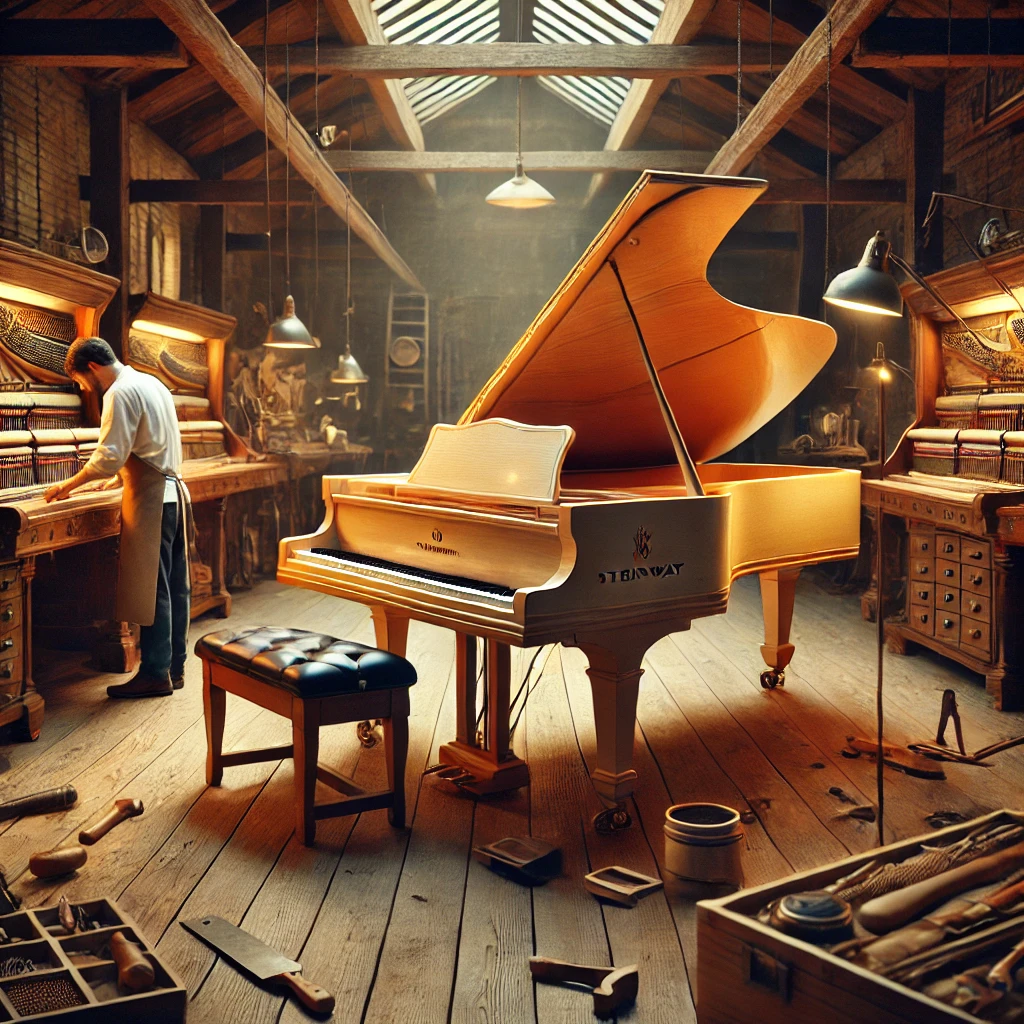In the world of pianos, Steinway & Sons has established itself as an iconic brand synonymous with excellence. Renowned for its exceptional craftsmanship, the company has perfected the art of piano making for over 160 years. But what sets Steinway apart from other piano manufacturers? The unique combination of technology and quality drives the brand’s innovative designs, offering unmatched sound, precision, and durability. In this blog post, we’ll explore how Steinway integrates advanced technology with superior craftsmanship to produce pianos that are not only visually stunning but also extraordinary in performance.

The Legacy of Craftsmanship at Steinway & Sons
Steinway’s commitment to quality begins with its long history of craftsmanship. The company was founded in 1853 by Heinrich Engelhard Steinway, who envisioned a piano that would combine technical innovation with artistic beauty. Over the years, the brand has maintained its reputation for precision, focusing on every detail of the piano-making process. Steinway pianos are still hand-crafted using the finest materials, and their skilled artisans are trained to uphold the company’s high standards.
While much of the process remains traditional, Steinway has embraced technological innovations that elevate production. The marriage of technology with time-tested craftsmanship has been key to the company’s continued success.
Cutting-Edge Technology: Elevating Quality in Every Note
Steinway’s commitment to technology is evident in every aspect of its pianos. The company utilizes advanced computer modeling to create precise designs that optimize the piano’s soundboard and string tension. These designs are further enhanced by cutting-edge digital simulation tools that allow engineers to analyze each piano’s sound and performance characteristics before it’s even built.
For instance, Steinway uses computerized acoustic modeling to ensure each soundboard produces a pure, resonant tone. By testing virtual prototypes, Steinway can achieve a level of precision that traditional methods cannot match. This technology integration has revolutionized how pianos are designed and built, ensuring that every piano delivers the highest possible performance.
In addition to acoustic modeling, robotic technologies are also employed in certain stages of the manufacturing process. While the final touches of a Steinway piano are still hand-crafted, robotics help with tasks like shaping the piano’s components and even testing string tension. This automation ensures consistency and efficiency, which is crucial when producing pianos at the highest level of quality.
Superior Materials for Unmatched Quality
The combination of technology and quality extends to the materials used in Steinway pianos. The brand sources only the best wood, metals, and other materials to create its instruments. The soundboards are made from solid Sitka spruce, a type of wood known for its exceptional acoustic properties. The rims are constructed from layered hardwood, ensuring both strength and flexibility. The result is a piano producing a rich, dynamic sound that enhances performance.
Steinway’s commitment to quality materials ensures that its pianos will last for generations. The brand’s careful selection of materials is part of its larger philosophy: creating incredible instruments built to withstand the test of time.
The Role of Precision Engineering
The integration of precision engineering in Steinway’s production process is another reason he produces high-quality pianos. Every aspect of a Steinway piano is designed to work in harmony, from the keys to the hammers, strings, and pedals. This level of engineering precision allows the piano to achieve tonal richness and clarity that sets it apart from other brands.
Steinway employs precision-cut hammers for uniformity across the piano’s range, enabling greater control and tonal consistency. Their advanced stringing technology ensures each string is perfectly tensioned, resulting in a more resonant sound.
Customization: Technology Meets Personalization
Another area where Steinway’s use of technology shines is in piano customization. Through the Steinway & Sons Custom Shop, customers can personalize their pianos to suit their preferences. Whether selecting the finish, adding custom inlays, or choosing the size and configuration, Steinway offers a variety of options to ensure that each piano is unique.
This process is made possible by advanced digital design tools that allow customers to visualize their customizations before the build begins. This blend of modern technology with traditional craftsmanship provides a personalized experience, allowing customers to own a one-of-a-kind Steinway piano.
FAQs About Technology and Quality at Steinway
1. How does Steinway combine technology with craftsmanship in their piano manufacturing?
Steinway incorporates cutting-edge technology, such as computerized acoustic modeling, robotic technologies, and precision engineering, alongside its time-honored craftsmanship. This combination ensures that each piano is finely crafted and delivers the highest quality sound and performance.
for more info
2. What key technological innovations does Steinway use in its pianos?
Steinway uses several technological innovations, including computer-aided design (CAD), computerized acoustic modeling, robotic component shaping, and string tension testing. These technologies enhance each piano’s precision, sound quality, and consistency.
3. What materials does Steinway use to ensure the highest quality?
Steinway selects only the finest materials, including solid Sitka spruce for the soundboard, layered hardwood for the rims, and premium metals for the strings. These materials are chosen for their durability and acoustic properties, ensuring the piano sounds beautiful and lasts generations.
4. How does Steinway ensure the durability of their pianos?
Steinway’s commitment to quality materials and craftsmanship, along with the use of precision engineering, ensures the durability of their pianos. Additionally, the brand’s careful attention to the selection of materials like wood and metal contributes to the long-lasting performance of each instrument.
5. Can I customize my Steinway piano?
Yes, Steinway offers a Custom Shop where customers can personalize their pianos. Whether they choose the finish, add inlays, or alter the configuration, Steinway uses advanced digital design tools to help customers create unique instruments that suit their tastes.
Conclusion: The Perfect Harmony of Technology and Quality
Steinway’s ability to combine technology with quality makes its pianos unique. By embracing modern innovations while preserving traditional craftsmanship, Steinway has created unparalleled sound, precision, and durability. From advanced digital modeling to precision engineering, every step of the production process is designed to achieve the highest possible quality. As a result, Steinway pianos continue to be the instrument of choice for musicians worldwide, offering the perfect harmony between technology and craftsmanship.



